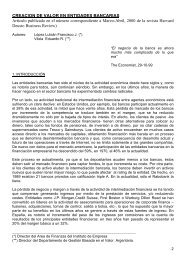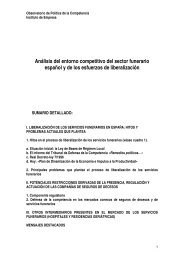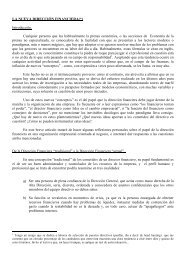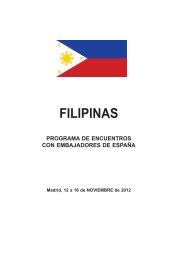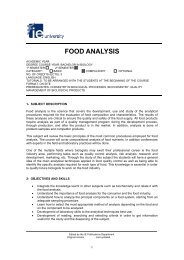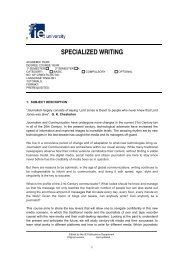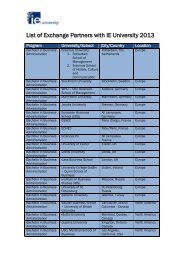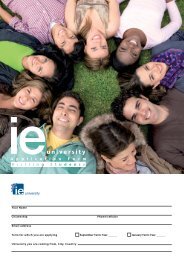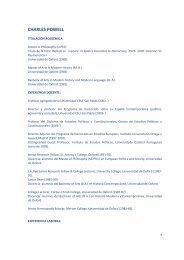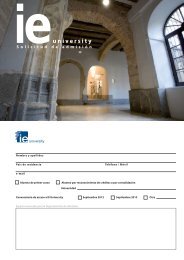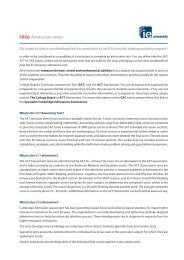BIOTECHNOLOGY - IE
BIOTECHNOLOGY - IE
BIOTECHNOLOGY - IE
You also want an ePaper? Increase the reach of your titles
YUMPU automatically turns print PDFs into web optimized ePapers that Google loves.
<strong>BIOTECHNOLOGY</strong><br />
ACADEMIC YEAR:<br />
DEGREE COURSE YEAR: 2º<br />
1º SEMESTER X 2º SEMESTER<br />
CATEGORY: BASIC COMPULSORY OPTIONAL<br />
NO. OF CREDITS (ECTS): 3<br />
LANGUAGE: English<br />
TUTORIALS: it will be set up the first day according to the student’s needs and availability<br />
FORMAT: In-classroom /residential<br />
PREREQUISITES: Genetics, molecular biology, biochemistry, microbiology<br />
1- SUBJECT DESCRIPTION<br />
Biotechnology is a field of applied biology that involves the use of living organisms and<br />
bioprocesses in engineering, technology, medicine and other fields requiring bioproducts.<br />
Biotechnology draws on the pure biological sciences like genetics, microbiology, animal cell<br />
culture, molecular biology, biochemistry, ecology, cell biology, etc. In many instances, it is also<br />
dependent on knowledge and methods from outside the sphere of biology such as chemical<br />
engineering, bioprocess engineering, information technology, and bio robotics.<br />
This course is designed to provide a general view of biotechnology field as well as the history<br />
and applications of DNA/RNA technology, molecular biology and bioethics. Skills for “life-long<br />
learning”, within this course will challenge students to apply critical thinking skills to their<br />
readings, class activities, laboratory exercises, and classroom discussions about current topics<br />
in molecular biology and bioethical issues relating to this powerful new technology.<br />
This syllabus is based on two modules:<br />
Module 1: Recombinant DNA technology: This module is based on the study of the main<br />
genetic engineer techniques and its applications in the Biotechnology field.<br />
Module 2: Biotechnology applications: In this module, it will be described the most important<br />
applications of the biotechnology science from microbiological applications, development of<br />
biotechnological processes to improve agricultural plants and development of innovative<br />
biotechnological products for human health and environmental protection.<br />
Edited by the <strong>IE</strong> Publications Department.<br />
Original version, . Last updated, .<br />
1⏐
2- OBJECTIVES AND SKILLS<br />
General objectives:<br />
– Understand the importance of the Biotechnology in several contexts and learning how to<br />
relate these concepts with other knowledge areas.<br />
– Integrate the knowledge and apply them to solve biological problems using the main<br />
basic techniques.<br />
– Development of autonomous and team working capacity<br />
– Use the scientific quality resources such as bibliography, specialized databases and<br />
other resources available in internet.<br />
– Express rigorously the biological knowledge acquired.<br />
– Acquire a critical thinking and ethical compromise.<br />
Specific objectives:<br />
– Understand the main and different applications of Biotechnology and be aware of the<br />
global Biotechnology perspectives for the future.<br />
– Analyze the constituent elements of a Biotechnology process.<br />
– Recognize the most used genetic engineer techniques.<br />
– Understand the bases of the cloning process and the different cloning systems.<br />
– Know the different expression systems and understand how they work.<br />
– Review gene therapy as a potential evolution in medicine for treatment and know the<br />
advances in the vaccine production and therapeutic agents<br />
– Understand the importance of the human genome sequencing.<br />
– Understand the advantages and disadvantages of Genetically Modified organisms.<br />
– Understand the main causes of contamination and know the use of the biotechnology in<br />
the monitorization, remediation and prevention of the environmental contamination.<br />
– Understand the intellectual property issues with focus on the recognition of patentability<br />
and the patent procurement procedure.<br />
3- CONTENT (Include aims of each topic/module, resources and timechart)<br />
Module I: Recombinant DNA technology<br />
Topic 1: Introduction.<br />
Sessions Nr: 1 (theory).<br />
Contents:<br />
- Concepts and definitions.<br />
- Historical development of the Biotechnology.<br />
Competencies:<br />
- Know and understand the real world impacts of biotechnology<br />
- Acquire a general view of the biotechnology science<br />
2⏐
Topic 2: Central Dogma of Molecular Biology.<br />
Sessions Nr: 1 (theory)<br />
Contents:<br />
- Structure and DNA replication. DNA polymerases.<br />
- Transcription and RNA polymerases.<br />
- Promoters. Operons.<br />
- Translation. Genetic code.<br />
Competencies:<br />
- Remind basic ideas of the DNA replication, transcription and translation processes.<br />
Topic 3: Basic methodology for genetic analysis at molecular level.<br />
Session Nr: 2 (theory)<br />
Contents:<br />
- Nucleic acid purification (DNA and RNA).<br />
- Enzymatic degradation of nucleic acids: DNases and RNases.<br />
- Nucleic acids synthesis. Ligases, phosphatases and kinases.<br />
- Oligonucleotides.<br />
- Restriction enzymes. Restriction maps.<br />
- PCR and RT-PCR.<br />
- Nucleic acids labeling: probes.<br />
- Northern and Southern blots.<br />
Competencies:<br />
- Acquire the basic knowledge of the main genetic engineer techniques, nucleic acids<br />
hybridization, PCR ….<br />
Topic 4: Cloning vectors<br />
Session Nr: 3 (theory)<br />
Contents:<br />
- Plasmids as vectors.<br />
- λ phage.<br />
- Cosmids.<br />
- YACs and BACs.<br />
- The cloning process.<br />
- Gene libraries.<br />
Competencies:<br />
- Know the cloning process and the different cloning systems.<br />
3⏐
Topic 5: Expression vectors<br />
Session Nr: 4 (theory)<br />
Contents:<br />
- Prokaryotes expression systems.<br />
- Fusion proteins.<br />
- Cell cultures<br />
Competencies:<br />
- Know the different expression systems and understand how they work.<br />
- Understand the concept of fusion proteins and their applications.<br />
Module II: Biotechnology applications.<br />
Topic 6: Gene therapy<br />
Session Nr: 5 (theory)<br />
Contents:<br />
- In vivo and ex vivo gene therapy.<br />
- Vectors.<br />
Competencies:<br />
- Be aware of the use of normal genes to supplement or replace defective ones or to<br />
bolster a normal function such as immunity.<br />
Topic 7: Genetic engineering applications to the detection and diagnostics systems.<br />
Session Nr: 6 (theory) 7 and 8 (Lab)<br />
Contents:<br />
- Immunologic diagnostics.<br />
- Monoclonal antibodies.<br />
- Prionics test.<br />
- Coliclonals antibodies.<br />
- Molecular diagnostics.<br />
- DNA fingerprint: applications to the forensic medicine.<br />
- DNA chips and Microarrays: applications.<br />
- Biosensors: types and applications.<br />
Competencies:<br />
- Be aware of the main genetic engineering techniques and understand their applications to<br />
the detection and diagnostic systems.<br />
4⏐
Topic 8: Human genome sequencing.<br />
Session Nr: 9 (theory) 11 and 12 (visit)<br />
Contents:<br />
- Project history.<br />
- Possible applications.<br />
- Ethical, social and legal aspects.<br />
- Other genome sequencing projects.<br />
Competencies:<br />
- Know the human genome history and understand the importance of it.<br />
- Get familiar with the sources of DNA and sequencing methods.<br />
Topic 9: Obtaining and use of transgenic plants.<br />
Session Nr: 9 (theory) 13 and 14 (visit)<br />
Contents:<br />
- Gene transference to plants.<br />
- Agrobacterium tumefaciens.<br />
- Promoters and "reporters".<br />
- Plant resistance to insects, herbicides and viruses.<br />
- Other improvements.<br />
- Transgenic aliments<br />
- Detection of transgenic aliments<br />
Competencies:<br />
- Know plants genetic transformation systems.<br />
- Understand the advantages and disadvantages of Genetically Modified Crops.<br />
Topic 10: Obtaining and use of transgenic animals.<br />
Session Nr: 10 (theory) 15 (workshop)<br />
Contents:<br />
- Microinjection technique.<br />
- Stem cells.<br />
- Nuclear transference: Dolly sheep.<br />
- "Pharming".<br />
- Mammary glands as bioreactors.<br />
Competencies:<br />
- Understand what transgenic organisms are; know its real uses and potential<br />
applications nowadays and their social involvement.<br />
5⏐
Topic 11: Vaccines and therapeutic agents.<br />
Session Nr: 16 (theory)<br />
Contents:<br />
- Traditional vaccines.<br />
- Genetic immunization: DNA vaccines.<br />
- Monoclonal antibodies as therapeutic agents.<br />
- Humanized antibodies.<br />
- Therapeutic agents against AIDS.<br />
- Antisense therapy.<br />
Competencies:<br />
- Be aware of the advances in the vaccine production with the help of biotech processes<br />
- Account for production and application of antibodies in pharmaceutical industries.<br />
Topic 12: Industrial microorganisms.<br />
Session Nr: 17 (theory)<br />
Contents:<br />
- Fermentations.<br />
- Industrial fermentations types.<br />
- Fermenters and Bioreactors: characteristics.<br />
Competencies:<br />
- Remind the concept of fermentation and understand its role in the industry.<br />
- Distinguish the differential characteristics of the fermenters and bioreactors.<br />
Topic 13: Fitorremediation and biomass utilization.<br />
Session Nr: 18 (Workshop)<br />
Contents:<br />
- Microbial degradation of xenobiotics.<br />
- Genetic design for biodegradative pathways.<br />
Competencies:<br />
- Understand the main causes of contamination and know the use of the biotechnology in<br />
the monitorization, remediation and prevention of the environmental contamination.<br />
Topic 14: Bioinformatics.<br />
Session Nr: 19 (theory)<br />
Contents:<br />
- Bioinformatics concept.<br />
- Applications.<br />
6⏐
- Biological data sources.<br />
Competencies:<br />
- Understand the Bioinformatics concept and its applications in the Biotechnology field.<br />
- Know the main Biological data sources and how to use them.<br />
Topic 15: Regulation of Biotechnology and patents.<br />
Session Nr: 19 (theory)<br />
Contents:<br />
- Liberation of organisms genetically modified to the environment.<br />
- Patents<br />
Competencies:<br />
- Understand the dangers and precautions of the liberation of organisms genetically<br />
modified to the environment.<br />
- Understand the intellectual property issues with focus on the recognition of patentability<br />
and the patent procurement procedure.<br />
Practical lab work:<br />
Practice Nr 1.<br />
Immunologic diagnostic assay: ELISA<br />
Sessions Nr: 7 and 8.<br />
Workshop activities:<br />
Workshop Nr 1. Genetically modified organisms.<br />
Sessions Nr: 15<br />
Workshop Nr 2. Fitorremediation.<br />
Sessions Nr: 18<br />
Visit activities:<br />
Visit Nr 1. Secugen. Molecular diagnostic and Sequencing.<br />
Sessions Nr: 11 and 12<br />
Visit Nr 2. CBGP. Centre for Plant biotechnology and Genomics.<br />
Sessions Nr: 13 and 14<br />
* Attending to all the programmed visits is compulsory for all students.<br />
7⏐
4- METHODOLOGY AND ECTS WEIGHTING<br />
Because of the nature of the subject and the objective to integrate theory and practice,<br />
educational activities will be organized around different format types:<br />
‣ Theory sessions: using blackboard, power point presentations and additional photocopies<br />
support with figures, schemes and tables. The classes will be interactive with the students,<br />
discussing the most difficult or special interesting aspects for them of every topic.<br />
The online campus and bibliographic resources will be used as support tools.<br />
*Use of computers in classroom: Use of computers in the classroom will not be necessary and<br />
therefore not permitted in the classroom unless specifically stated by the professor.<br />
‣ Workshops: the students will apply some theory aspects to solve some questions and<br />
problems with practical applications individually or in groups.<br />
‣ Practical work in the lab: after explaining the activity contents at the beginning, the teacher<br />
will solve the possible doubts and supervise the practical work and the discussion of the<br />
obtained results. The students will organize all the results in a lab report and analyze them<br />
correctly to answer some questions and problems given.<br />
‣ Visits: students will have the opportunity to visit several important companies to see real-life<br />
applications of the concepts and issues we will study in class. After each visit, the students will<br />
deliver a report for their evaluation.<br />
‣ Tutorials: it will be set up the first day according to the student’s needs and availability.<br />
Note on laboratory work:<br />
- By default, students will work in groups of two, (students wishing to work alone should<br />
propose it and obtain approval from the teacher).<br />
- For doing the practical work, the students will need the lab coat. Other possible<br />
necessary things will be specified the first day of the course.<br />
- Students not attending at the 75% of the classes will lose their rights for the evaluation<br />
of the subject, obtaining a 0 score on the first and extraordinary calls for examination.<br />
- Only in the justified attendance absences cases, students will do an extra activity<br />
related with the lost part, according to the teacher criteria, from which the student could<br />
be able to get the grade for the lost part.<br />
8⏐
Distribution of educational activities.<br />
Activity<br />
In-class<br />
Sessions<br />
(@1,5hr)<br />
Hours<br />
Students<br />
papers<br />
Theory lessons 11 16.5 20 1.65<br />
Practical work in the<br />
lab<br />
2 3 6 0.3<br />
Workshops 2 3 11 0.3<br />
Visits 4 6 6 0.6<br />
Total 19 28.5 43 3<br />
Exam 1 1.5 0.15<br />
ECTS credits<br />
5- EVALUATION SYSTEM<br />
5.1. GENERAL OBSERVATIONS<br />
The participation in the different activities is compulsory for the final evaluation of the subject.<br />
Attendance will be compulsory in the % stipulated by the University for students being<br />
evaluated.<br />
The academic performance of the students and their final mark on the subject will be evaluated<br />
continuously throughout the course according to the criteria summarized in the following lines:<br />
5.2. EVALUATION AND WEIGHTING CRITERIA<br />
FINAL WRITTEN EXAMINATION: 40%<br />
The evaluation of having incorporated critical knowledge elements from the theory part of the<br />
subject will be carried out by a final written examination. The exam will consist in several<br />
questions on theory and practice discussed in class during the course.<br />
PRACTICAL WORK IN THE LAB: 15%<br />
It will be appreciated the creativity and the rigorous of the students in the lab work. The teacher<br />
will value the understanding of the concepts, team work capacity and the respect for the<br />
materials and equipments in the lab. At the end of the practical period, students will deliver to<br />
the teacher their lab notebook and a final report to complete the evaluation of this part.<br />
EXERCISE AND PROBLEM RESOLUTION WORKSHOPS: 20%<br />
The capacity to apply theoretical learning will be evaluated by the resolution of questions,<br />
problems and exercises proposed by the teacher during the course.<br />
9⏐
VISITS REPORTS: 15%<br />
The interest and the attention exhibited during the visits together with the ability to summarize<br />
accurately the concepts acquired during the event in a final report will contribute to the grade of<br />
this part. The quality and the presentation of the paper will be appreciated.<br />
ATTITUDE: 10%<br />
The attendance, the active participation in the activities proposed and the interest in the subject<br />
exhibited in class will be evaluated positively in the final punctuation.<br />
Grading notation<br />
A quantitative estimate of the grades for each student will be reported on a 1 to 10 scale with 10<br />
being the maximum attainable.<br />
Notes:<br />
* Students not attending at the 75% of the classes will lose their rights for the evaluation of the<br />
subject, obtaining a 0 score on the first and extraordinary calls for examination.<br />
Only in the justified attendance absences cases, students will do an extra activity related with<br />
the lost part, according to the teacher criteria, from which the student could be able to get the<br />
grade for the lost part.<br />
* Due to the nature of the subject, all visit sessions are mandatory. If the students miss a day<br />
when visits are conducted, they will still have the opportunity to turn in the visit report even if<br />
they were not present at the time of the visit. However, an automatic deduction of 30% will be<br />
taken from each assignment if the student does not attend the visit on the specified day.<br />
*Homework assignments may be submitted late, but the following penalty will be applied:<br />
- 1 day late: 10% deduction, up to 24 hours late<br />
- 2 days late: 20% deduction, from 24 to 48 hours late<br />
- 3 days late: 30% deduction, from 48 to 72 hours late<br />
- more than 3 days late: no work will be accepted after 72 hours late<br />
One day late is defined as a 24-hour period starting at the time the assignment is due (weekday<br />
or weekend).<br />
* Students not passing the subject on the first call for examination shall take an extraordinary<br />
exam covering the entire subject in which the weighting will be the same as described in the<br />
table above. In this case, the passed parts will be kept for the following calls for examination of<br />
the subject, in case it is needed.<br />
Recommendations to students:<br />
- Attend 100% of all class sessions<br />
- Participate actively. Involve yourself in both theory and practical classes asking questions<br />
and/or providing comments related to course learning objectives.<br />
- Read the assignments ahead of time and make a reasonable effort to understand them<br />
- Formulate your specific questions by consultation during tutorial hours.<br />
- Do the exercises and deliver all the reports proposed by the professor.<br />
- Consult complementary bibliography and internet sources.<br />
10⏐



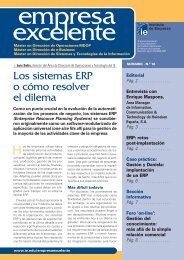
![Change Management Workshop Program Brochure[pdf] - IE](https://img.yumpu.com/22502183/1/184x260/change-management-workshop-program-brochurepdf-ie.jpg?quality=85)
